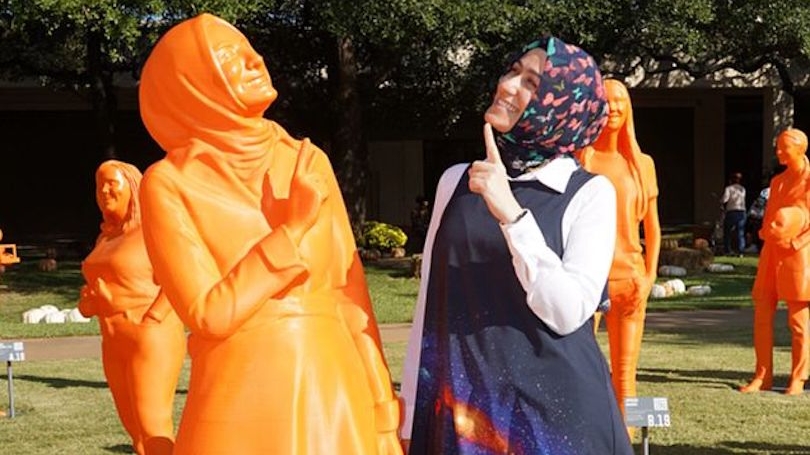
- About
- Departments & Programs
- Faculty Resources
- Governance
- Diversity
- News
Back to Top Nav
Back to Top Nav
Back to Top Nav
Back to Top Nav
The 'If Then She Can' statues showcase contemporary women innovators.
This fall, Assistant Professor of Physics and Astronomy Burçin Mutlu-Pakdil can be seen as a life-size 3D-printed statue as part of "#IfThenSheCan — The Exhibit", a collection of 120 statues of leading women in science, technology, engineering, and math.
Following an enthusiastic reception last year at the National Mall in Washington, D.C., the collection will "pop up" at three Dallas venues this month. Fifty statues, including Mutlu-Pakdil's, will be on display at the Dallas Arboretum and Botanical Garden from Sept. 9 through Dec. 31.
The exhibit is part of an initiative spearheaded by Lyda Hill Philanthropies to activate a "culture shift" among young girls to open their eyes to STEM careers. Each statue features a QR code that visitors can scan with their phones to learn more about the respective innovator.
"I didn't have any role models when I was a kid," says Mutlu-Pakdil, who grew up in Turkey before attending graduate school in the United States. "Throughout my academic career, I was told numerous times that I had no place in STEM."
Ultimately, Mutlu-Pakdil's passion for pursuing new knowledge about the origins of the universe propelled her to forge her own path—with remarkable and hard-earned results. Her research led to the discovery of an extremely rare galaxy, now commonly referred to as Burçin's Galaxy. Called "one of the most notable astrophysicists today" by Inc. magazine, Burçin Mutlu-Pakdil served as a 2020 TED Senior Fellow, among many other honors.
In 2019 she was selected by the American Association for the Advancement of Science and Lyda Hill Philanthropies to serve as part of a cohort of "AAAS If/Then Ambassadors"—high-profile role models for middle school girls. In addition to funding and elevating women in STEM, the program seeks to inspire girls with portrayals of women in STEM through media and learning experiences.
"#IfThenSheCan — The Exhibit" debuted in Dallas in 2021 and was hosted by the Smithsonian on and around the National Mall in March. The full exhibit has been experienced by more than 3 million people.
"I had the opportunity to visit the exhibit in both locations and engage with kids around my own statue," Mutlu-Pakdil says. "Because I am an astrophysicist, my statue points to the sky to encourage kids to look up at the sky. It was incredible to see children imitating my pose in front of my statue, pointing to the sky, and their parents photographing them."
"We are calling this exhibit, the 'If Then She Can' exhibit because we know that if we show little girls all these amazing women doing all this amazing work in this world that each of them will know that they too can grow up and they too can change the world," Nicole Small, CEO of Lyda Hill Philanthropies, said in an interview with TODAY.
"The exhibit shows everyone what scientists look like, and that science is for everyone," Mutlu-Pakdil says.